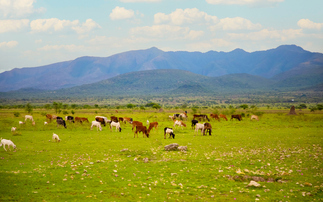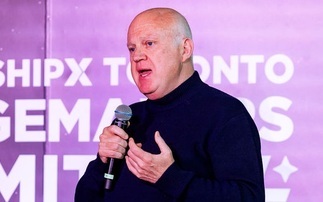
Industry Voice: Schneider Electric's Amy Haddon ponders whether the UN Climate Change Summit delivered on businesses' hopes
In November, I had the privilege to represent Schneider Electric at the UN's Conference of Parties (COP) on climate change in Glasgow. Over the course of more than two weeks, representatives from nearly every country in the world met to align on the next critical steps in the global fight against climate change, resulting in the Glasgow Climate Pact.
This COP was unlike the previous 25 iterations, in that it took place during a global pandemic. It was also the fifth anniversary (though delayed by a year due to Covid-19) of the historic Paris Agreement, executed in 2015, making it a milestone year in which countries were mandated to revisit and update their Nationally Determined Contributions (NDCs).
So, what happened? Did COP26 deliver what it hoped to achieve? And - importantly - what are the implications for business?
There were a number of key climate pledges made during COP26 that will have long-term, positive ramifications, especially if the promises are actually kept (keeping in mind that COP is non-binding).
These included:
- India's announcement that it will reach net zero emissions by 2070 with 50 per cent renewable electricity by 2030 (a helpful analysis of this target can be found here)
- A pledge by more than 100 countries - including Brazil - to end deforestation by 2030, a critical first step towards carbon sink and biodiversity preservation
- Another pledge by more than 100 countries to cut methane by 30 per cent by 2030, essential for reducing this potent and prevalent greenhouse gas
- A commitment backed by $130tr in assets for the net zero transition by GFANZ, the Glasgow Finance Alliance for Net Zero
- The return of the US to the negotiation table, accompanied by President Biden's announcements about the President's Emergency Plan for Adaptation and Resilience (PREPARE), the US's long-term roadmap to achieve net zero emissions by 2050, the Net Zero World Initiative for technology development, the Clean Energy Demand Initiative (CEDI) to expand global market opportunities for clean energy, the First Movers Coalition, a consortium of corporations dedicated to green procurement, and a historic US-China pact on climate action.
- A variety of smaller, but significant, commitments on accelerating the energy transition, net zero steel production, fossil fuel phase-outs globally and specifically in South Africa, EV ambitions, and exploration of nuclear power and carbon capture and storage (CCS) technologies.
Despite its ambitions, however, some have argued the Glasgow Climate Pact (GCP) fell short of expectations. One aim of the conference was to 'keep 1.5 alive' with the hope that national contributions would achieve a 1.5 degree Celsius warming trajectory. In reality, the current pledges align more closely to 2.7 degrees Celsius, not enough to avoid the worst impacts of global warming.
A mixed result of negotiations was that mention of the reduction of fossil fuels was included in the final agreement for the first time since the original 1995 COP. However, last-minute changes by several countries resulted in the adoption of the term 'phase-down' instead of ‘phase-out' in the final GCP, a disappointment to many given the urgency of climate change according to the latest science.
The GCP was not a total loss, however. Negotiators were able to finalise the Paris Agreement rulebook, which governs how countries must set and report on their emissions reductions targets. More than 100 countries presented revised commitments, bringing the total global emissions covered by NDCs to 80 per cent, and countries must be prepared to revisit and revise their commitments for COP27, an accelerated timeline.
Bottom Line for Business
The business community had a far larger presence at this COP than any other - including Paris - and discussions of the role of so-called 'non-state actors' were prevalent. But what impact do the pledges made and the finalized GCP actually have on business?
A few things to watch:
- The energy transition
The movement - which was well underway pre-COP26 - received a boost with the included provisions for a phase-down of coal power, phase-out of fossil subsidies, and several of the individual and country-level commitments towards clean energy and electrification. While the decisions taken were not as impactful as hoped, these new ambitions are certain to hasten the move away from coal and in favor of more efficient production of non-renewable power like natural gas and nuclear.
Companies have already played a large role in accelerating the energy transition, and show no signs of slowing, despite renewable energy supply chain woes and rising volatility in both energy supply and pricing globally. However, the forward-leaning GCP language, combined with many individual geographic mandates (such as the EU 'Fit for 55' package), will almost certainly further accelerate the transition to a clean energy system.
- Biodiversity and nature-based solutions
Emissions reducing mechanisms in the form of afforestation, forest conservation, soil restoration, and ocean and cryosphere protection/restoration were a large focus of the event, and of their own COP15 event in October. Companies with vested interests in land use, agriculture, and other related industries can anticipate there will be increasing pressure and potential legislation in these areas.
One notable development is the Taskforce on Nature-related Financial Disclosures (TNFD), which is in the process of creating a framework to guide organisations on risk management and transparency when it comes to natural capital exposure.
- Standardising net zero commitments
While not included in the formal COP26 negotiations, there is an increasing call, globally, for standardised net-zero definitions and reporting frameworks. The recent development of the IFRS International Sustainability Standards Board (ISSB) is one step towards a more integrated and universal reporting standard and the SBTi Corporate Net Zero Standard brings some clarity to net zero for the business community - but there's still a long way to go.
What is less clear is who owns the responsibility for the development of these definitions and frameworks. Should it be regulated - or is this something for the business community to develop for itself? Organisations can engage on this topic through their business associations, who are influential in their own right, and influential on policymakers.
- Transparency, disclosure, and communications
Finally, organisations of every size and from every sector are talking about communications. The need to communicate about energy and sustainability with stakeholders is a growing consideration and need, particularly as these stakeholders become essential participants in the energy transition. Fluency in sustainability storytelling is a new kind of capital.
COP is and remains, fundamentally, a policy event. However, there is an increasing role for businesses to play when it comes to proactive environmental policy, and we anticipate that the ramifications of the activities of COP26 will play out for years to come at the organisational level.
Amy Haddon is director of global content marketing and communications services at Schneider Electric.
To learn more about how your business can join the net-zero future, explore our interactive guide to Basic, Better, and Best frameworks on the path to net-zero, and gain access to checklists for goals to set, common action steps, reporting recommendations, and more for each level.
This article is sponsored by Schneider Electric.







